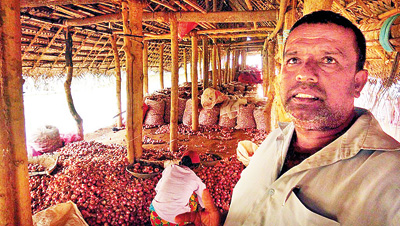News
Govt.’s price controls useless as merchants hold onto stocks
Stocks of sardines, onions and oil have all but disappeared from shops as wholesalers hold onto stocks rather than sell at the new lower prices announced by the Government, creating a false shortage that keeps prices high.

Only at Sathosa outlets, items are sold at prices announced by the government even before the gazette to the effect was published. Pic by Indika Handuwala
While consumers are calling for the new prices to be gazetted so that traders and wholesalers would be forced to sell them at the lower prices, a Consumer Affairs Authority (CAA) official explained that this could not happen yet.
Sathosa, the only outlets selling tinned fish, onions and sugar at the lower prices, has been forced to limit sales to customers to prevent merchants buying up stock to create shortages that would force people to buy at higher prices from them.
Lanka Sathosa Chairman Naushaad Perera said as a government-operated institute Sathosa was selling the three items according to the new government pricing, with a tin of sardines at Rs. 200, large onions at Rs. 100 a kilo and sugar at Rs. 85 a kilo.
The old prices are Rs. 280-315 for sardines (according to brand), large onions at Rs. 280-300 a kilo and sugar at Rs. 140 a kilo.
Sathosa is limiting purchases to three tins of sardines, one kilo of onions and three kilos of sugar per customer in order to foil unscrupulous merchants.
Mr. Perera said the restrictions had been forced on customers because merchants were buying up large stocks to sell again at higher prices and to keep a monopoly by depleting Sathosa outlet stocks.
“Since the prices are not gazetted the merchants are not legally obliged to follow the government decisions and therefore are selling sugar, sardine and big onions to higher prices,” Mr. Perera said.
Sathosa is giving away a kilo of lentils free of charge for customers buying more than Rs. 500 worth of goods, he added.
This offer has come under fire by the National Movement for Consumer Rights Protection, which says Sathosa is violating the Consumer Affairs Authority Act offering free lentils as an inducement for customers to spend more than Rs. 500.
Mr. Perera rejected this, saying the price of lentils was not gazetted and therefore the item could be offered free.
The consumer movement’s head, Ranjith Vithanage, agreed with Mr Perera that the government should enshrine the price reductions on canned sardines, onions and sugar in a gazette.
“The President’s media unit does not determine the price changes. The changes must be gazetted, otherwise they cannot be implemented,” Mr. Vithanage said, pointing out that the old price for large onions at Rs. 300 a kilo had been gazetted.
Grocery shop owners and traders say they cannot sell these goods at the government’s lower prices because they had been bought wholesale at higher prices.
A Pettah trader who requested anonymity said he had lost Rs. 8 million having to sell onions at the lower price.
“The tax reduction does not apply to previously imported goods,” he said. “I paid the old tax to clear my consignment of onions, and now I am being forced to sell it at government-controlled prices,” he said.
Grocery shop owners claim they cannot get sardines, onions and sugar to sell to customers at the new, lowered prices because although wholesalers have – grocers assert – piles of the goods in their store rooms they claim to have run out of supplies.
A grocery shop owner, Mahesh Ratnayake, complained that shortages had arisen because wholesale merchants had hidden stock. He had not been able to find tinned sardine, onions or sugar at Pettah Market wholesale stores.
“The sugar that was available at the market was Rs. 128 a kilo and I didn’t buy it as I can’t sell it at the government-controlled price,” Mr. Ratnayake said.
He had faced a similar situation in March when the government reduced the prices of essential commodities during lockdown.
A senior CAA official who requested anonymity explained that as stocks of tinned fish, onions and sugar that had been imported before October 14 were still on the market authorities would have to wait until merchants finished the old stock – that could take two more weeks – before gazetting the reduced prices.
He also said it had to be proved that merchants were selling price-controlled items for higher prices in order for the new prices to be gazetted.
“If suddenly the new prices are gazetted the merchants will be unable to sell earlier purchased goods,” he said.
Consumers say it makes them angry that the CAA appears to be serving merchants rather than giving relief to consumers.
The CAA official said the authority would investigate the matter and take action against merchants who hoard essential items.
| Onion farmers demand return of old price | |
| Farmers are angry that the Government has lowered the price of large onions saying they want to sell their stocks to traders at the old price but traders were walking away.  Onion farmers say the price control has hit them hard at a time when they have put more land under onion cultivation. Pic by Kanchana Kumara The farmers say their problems are compounded by the fact that the put more land under onion cultivation than in previous times as the Government had urged them to do so. They explained that they were unable to sell their harvest as the government imposed a control price of Rs 100 per kilo. The farmers said that they had grown more onions as the Government had promised a good price for their produce but now they have been left with large quantities of produce on their hands as no one was purchasing them. S.A. Ratnapala, a farmer residing in the Pattiwila area of Dambulla, said the twin effects of lowered import taxes on large onions and lowered prices had drastically reduced the worth of onions. With no sales occurring at the Dambulla markets he is being forced to store onions at his house, he said. “If the government delayed the lowering of the import taxes the local onion cultivators would not be affected,” Mr. Ratnapala said. Farmers are asking President Gotabaya Rajapaksa for a 15-day grace period during which the old prices can be restored to allow them to sell onions at their preferred price. |

